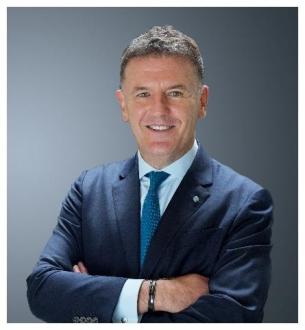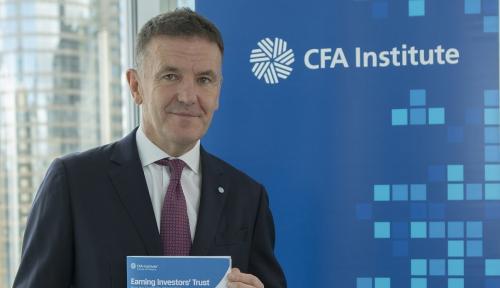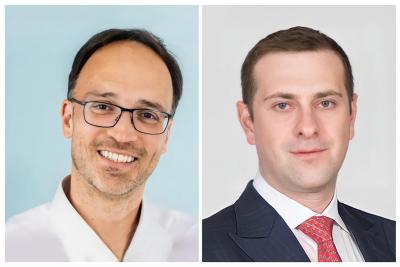Strategy & Practice Management
CFA Institute Zooms in on the Evolution of Trust in APAC Investment Management

Jul 6, 2020
CFA Institute, the global association of investment management professionals, on June 17 launched its fourth edition of its Trust Survey, titled ‘Earning Investors’ Trust: How the Desire for Information, Innovation, and Influence is Shaping Client Relationships’, based on studies of retail and institutional investors in 15 markets globally, including in APAC Australia, China, Hong Kong, India, Japan, and Singapore. Nick Pollard, Managing Director for Asia Pacific of CFA Institute, ‘met’ with Hubbis recently via video call to offer his take on the findings and to highlight some of the challenges CFA Institute has been facing - and largely but not entirely yet overcoming - and to outline his plans for what he still sees as many good years ahead for CFA Institute in the region, as it resumes its much-heralded role as the engine for global economic growth.
CFA Institute prides itself on not only providing benchmarking education programmes for the investment management industry globally but on thought leadership surveys and reports that help CFA Institute and its members identify and track the key evolutionary trends.
The CFA programme itself is largely aimed at two key roles within the investment management industry worldwide - research analysts and portfolio managers. “We adapt only about 5% to 10% of the curriculum each year,” Pollard explains, “thereby fine tuning it to ensure we are comprehensive and capture the latest market evolutions; we follow fashion, we do not drive it. So, for example, more weightings towards ESG, fintech, AI, and elementary coding are part of the new curriculum that is now under construction.”
The fourth edition of the ‘Trust’ survey is designed to help the investment management members participate with coordinates on the evolution of their industry, especially as it relates to their particular roles. “There are many key findings,” Pollard comments, “and we invite anyone to download the reports from our site, but the big picture is that the findings offer a vision of how the industry needs to improve compared with other industries and other regions. For example, we found that investors value information, innovation and influence in their interaction with the wealth management providers, and in each of these areas, there remains room for further improvement.”
The report revealed, for instance, that slightly less than half of investors in Asia Pacific (APAC) trust the financial services industry. Trust in the financial services industry scored 49%, while retail investors’ trust in medicine is 68% and technology 67%.
The Trust Survey was conducted with 3,525 retail investors and 921 institutional investors in October and November 2019. The surveyed markets included Australia, Brazil, Canada, Mainland China, France, Germany, India, Japan, Mexico, Singapore, South Africa, UAE, UK, US, and Hong Kong SAR, China. Retail investors were aged 25 years or older with investible assets of at least USD100,000, except in India where the minimum was adjusted to 500,000 rupees. Institutional investors included individuals responsible for investment decisions with at least USD50 million assets under management, from public and private pension funds, endowments and foundations, insurance companies and sovereign wealth funds.
The survey found that some 58% of retail investors value access to technology over access to humans for investment management, the same as in 2018. However, advice is still the domain of humans, with 61% saying they trust recommendations from a human advisor more than a robo-advisor.
The survey found 87% per cent of retail investors in India said they trust the financial services industry, which puts the country at the top of the list of the 15 surveyed markets, whilst Australia ranked last, with only 24% respondents saying that they trust the industry.
When comparing the evolution of trust levels between 2018 and 2020, Hong Kong came out at 52% versus 35% in 2018, while India, the UAE, and Brazil have recorded the biggest rises, although Singapore and Australia are, somewhat surprisingly, among those that reported the biggest drops.
More than 70% of APAC investors said they value information such as transparency of fees and reports that are easy to understand. They also prefer working with investment professionals with credentials from respected industry organisations.
Over 80% of retail investors believe their financial advisor is legally required to act in the client’s interest above their own, but only 36% say their advisor always puts their interests first. Among institutional investors, only 26% think their investment firms put client interests first. Some 75% said they trust that their investments will provide enough wealth so that they will not need to work past their desired retirement age.
Brand is increasingly used as a confirmation or signal of trust, with 60% of retail investors saying they would rather work with a firm with a brand they can trust than one with people they can count on. Over 80% of investors showing a high level of interest in ESG Investing.
Some 46% of retail investors said their financial advisors are transparent when it comes to the impact of market events, and 49% said they are transparent when it comes to fees.
Various factors could cause retail investors to consider leaving their financial advisors, among which are underperformance (40%), a data/confidentiality breach (37%), unresponsiveness and high fees (33%).
“This time of heightened market volatility sets up a very different path for those who will succeed in meeting their investment goals and those who will not. Fear and panic can obscure sound investment decision-making,” says Pollard.
“Our survey is all about trust in the investment management industry, which during this remarkably challenging phase is more valuable than ever. Investment professionals who understand and navigate the layers of investor trust will be better equipped to serve their clients and demonstrate how the investment industry can better serve society.”
Pollard adds further commentary on the many findings. He reports that the trust and advisory service sector in APAC has not greatly improved in the last two years.
“It is still about 49% to 50% of our respondents who said they did trust this industry, which means actually a lot of people don’t, to be perfectly honest,” he remarks. “In terms of innovation and technology, the importance of access to technology as opposed to an advisor is higher in APAC than it is globally - 58% against 50% - and that is fairly obviously driven by the fact that in general APAC advisors are more tech-savvy and more comfortable using technology.”
But having said that, he adds, there is still 61% who trust investment advice from humans over and above robo-advisors, which is less than the global total of about 73%. “Nevertheless,” he comments, “it is still over 50%, and shows that in this region at the moment there is still room to go in terms of AI and algorithms and robotic portfolio advice being more universally accepted.”
Pollard explains that the findings align with the acknowledged greater propensity to value the use of technology in the provision of advice within APAC, more so than seen in Europe or North America.
“However,” he comments, “it is still the case that the human advice model remains in favour, with the 61% of respondents preferring this delivery. It aligns with those theorists, for example, in the book ‘Betterment in the US’ by Jonathan Stein, that argue against the rise and rise of robo-advisory."
"Stein found that the wealthier his customers became, the more they wanted to deal with a human being, someone who not only could respond holistically to their needs but who could also explain what was going on in the black box. In fact, CFA Institute has been focusing increasingly on teaching about coding, about how fintech works, so that our members are more prepared for these kinds of questions.”
Hong Kong, he comments, remains the market where investors are more sceptical about their advisors, with only 5% saying their advisors always put their needs first, down from just 7% in 2018. “We can surmise the main reasons for this,” Pollard comments, “including the investors there being older, as it is a more mature market, and we all know people tend to become more cynical over the years, and the scars of the Global Financial Crisis are still there.“
Pollard also highlights a noteworthy finding relating to ESG strategies. “Some 22% of institutional investors said that they already have ESG products within their portfolio, but only 9% of retail,” he reports. “However, almost 50% in both categories are very interested in knowing more about it and doing something about it in the near future, with institutional investors more likely to be swayed by better returns, while retail investors are more likely to focus on sustainability issues and social impact.”
This, he adds, gels with comments from BlackRock’s Larry Fink in his annual letter in early 2020, commenting that people are more socially conscious now about what they want to invest in and what impact they want to have with their investments. “ESG adoption is, in fact, modest to date in Asia,” Pollard observes, “but that is it clear from the survey that appetite is considerable. He explains that this is driven by the search for yield, especially amongst institutions who see ESG as a catalyst for higher risk-adjusted returns, and amongst retail investors, it is driven more by social objectives.
Asia – growth ahead for CFA
Pollard then updates the progress CFA Institute has been making in Asia, where the two biggest markets remain China and India. CFA Institute will by the end of 2020 have four operations in China, and recently launched a new platform called ‘China Live!’, a virtual educational leadership platform, with 850,000 views on its very first day. In India, Pollard reports CFA Institute already has over 3,000 members, it is also the third biggest market for candidates anywhere in the world.
“We remain massively confident that China and India will carry on being the powerhouses of growth for the Institute in Asia,” he states, “and we are continuing to invest in that context.”
He explains that CFA Institute is also moving to computer-based testing and adopting more technology solutions, an initiative that had been ongoing well before the virus hit. “The mission is that all exams that make up the CFA programme will be tested on computers as opposed to pen and paper, making us more flexible in how we distribute the exam and the content and the curriculum,” he reports. “We now rely on gigantic test centres, in the region, so in Beijing, for instance, the centre can house up to 15,000 candidates at any one time, so this is not ideal for the type of lockdown we have now, and in fact, we have had to postpone exams for the very first time.”
And he notes that the CFA curriculum is more than just about technical skills, it teaches ethics as well. “If you want to achieve customer and client approval,” he explains, “it is clear you also need a code of conduct and being a CFA charterholder demonstrates that. All the evidence that we have in terms of the customer motivation to conduct business with organisations in the context of trust underline that the crucial importance of the credentials of the advisors they deal with. Simply, more and more firms now want to be associated with us because of that credibility that we bring; it helps them become more successful by demonstrating both technical competence and adherence to ethical standards. You get both those commendations with the CFA charter.”
He also remarks that CFA Institute offers a global credential rather than reflecting any particular requirements of one market or another. “For the future, however,” he reports, “we might consider the world of micro-credentials in very specific topics or specific markets or products that people could take without necessarily having to take the whole CFA programme, which is a major commitment on their part. Essentially, we are now strategising how we can leverage our brand.”
A brighter future?
Pollard takes the opportunity to comment on the outlook post-pandemic, remarking that at least as a starting point, financial and wealth management institutions were better capitalised and organised when the virus struck than at the onset of the GFC. He predicts the largest firms will fare better, and the crisis will induce more consolidation in the smaller and medium sized firms, especially those that have less of a unique proposition to offer.
He also notes that the ramifications of the virus for the use of office and central city space are not encouraging. CFA in Hong Kong, for example, has shelved plans to expand its office space there, as work from home policies take a firmer grip on the mentality, and as it is evident that people will want to travel and fly less, at least for the foreseeable future. “We had an expert drop by who indicated that commercial property rents in Central Hong Kong would likely be down 18% by the end of the year, a dramatic turnaround from the trend of past years,” he reports.
Despite some of the major hurdles ahead, Pollard closes with a comment on how optimistic he is about CFA Institute in Asia. “This region is home to over half of all CFA candidates,” he says, “and we remain highly confident that APAC will retain its status of driving global growth for the organisation.”
Pollard’s Priorities in Asia
First up is to ensure the December examination goes ahead, as CFA Institute had to defer the June exam. “But the reality is fairly daunting,” he explains, “as social distancing must be achieved in the exam room and there will be more people due to the June postponements, so we would need at least twice the normal space. And we have no idea yet if gatherings of that scale will even be permitted by then.”
Secondly, CFA Institute is conducting a strategic review of how to boost CFA’s relevance. “We are analysing how we can add more value not only to the industry but also derive more value for our societies and our members than we have to date, so this is a developmental initiative,” he explains. “And our third key priority is the introduction of computer-based testing as I highlighted earlier.”
CFA Institute – A Snapshot
CFA Institute is the world’s largest association of investment management professionals. The firm’s literature reports that its global community of more than 175,000 members and 150 plus member societies is dedicated to upholding the highest educational, ethical, and professional standards in the investment industry for the ultimate benefit of society.
CFA Institute has led investment management credentialing and industry standard-setting for more than 70 years. In partnership with member societies, CFA states it champions ethical behaviour in investment markets, advocates for public policy and produces research that highlights the drive to put investors’ interests first, and provides investment knowledge to the global financial community.
Getting Personal with Nick Pollard
Pollard comes originally from Colwyn Bay in North Wales and attended Rydal School there before heading off to University College London to study geography.
He joined CFA Institute in 2016 as managing director for Asia Pacific. Based in the Hong Kong office, he also oversees operations in Beijing, China and Mumbai, India. He is responsible for working with all CFA Institute stakeholders, increasing the number of candidates entering and moving through the organisation’s credentialing programmes, and working with institutional partners (employers, universities and regulators) throughout the region. He is actively engaged with 21 CFA Institute societies that represent around 30,000 members in the region.
Pollard is a seasoned wealth management and banking executive and has brought to CFA his own combination of strategic leadership skills as well as learning and professional development expertise.
He has lived and worked in the APAC region since 2009 and resides in Hong Kong. Prior to joining CFA, he enjoyed a prominent role as CEO of The Royal Bank of Scotland’s Coutts Asia division and, immediately before taking the role at CFA was the Head of International Learning and Professional Development for Coutts International.
He began his career with NatWest Group, subsequently part of the RBS Group, where he gained experience in marketing and talent development. He has worked in five different countries during his career, and at one time was HR Director for the wealth management division of RBS, an experience that has greatly helped him in his current role at CFA.
“During my time as CEO of Coutts for Asia, the business was struggling, but we got it back on its feet during my tenure, so I have had that front, middle, and back experience of running a whole business. All the roles I have taken on in the past I have filtered into this role, which to this day remains an interesting and positive experience.”
Married with a son aged nine, Pollard notes that his wife is from Hong Kong. “We love it and enjoy all aspects of life here under normal circumstances,” he reports. “Spare time might be spent hiking in Hong Kong or elsewhere in the region, or when sport is on watching Wales play rugby – occasionally a joy and also often a punishment, as you know – and also watching Leeds play football, which has also been a mixed pleasure for many years. Travel in the region for business and leisure remains a great pleasure, again in more normal times.”

Managing Director, Asia Pacific at CFA Institute
More from Nick Pollard, CFA Institute
Latest Articles






